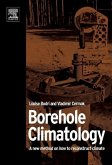A borehole is the generalised term for any narrow shaft drilled in the ground, either vertically or horizontally. A borehole may be constructed for many different purposes, including the extraction of water or other liquid (such as petroleum) or gases (such as natural gas), as part of a geotechnical investigation or environmental site assessment, for mineral exploration, or as a pilot hole for installing piers or underground utilities. Boreholes used as water wells are described in more depth in that article. In the engineering and environmental consulting fields, the term is used to collectively describe all of the various types of holes drilled as part of a geotechnical investigation or environmental site assessment (a so-called Phase II ESA). This includes holes advanced to collect soil samples, water samples or rock cores, to advance in situ sampling equipment, or to install monitoring wells or piezometers. Samples collected from boreholes are often tested in a laboratory to determine their physical properties, or to assess levels of various chemical constituents or contaminants.
Bitte wählen Sie Ihr Anliegen aus.
Rechnungen
Retourenschein anfordern
Bestellstatus
Storno








